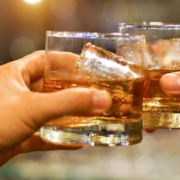Cleaning Up Our Evening Tipple
By Dave Trecker
Those of us of a certain age look forward to the small pleasure of a drink before or with the evening meal, a tipple as the English would call it.
We know it’s not especially good for us, but in these troublesome times of pandemics and collapsing economies, it’s way down our list of concerns. We have more important things to worry about.
The same applies to hangovers, those painful by-products of imbibing that we accept as part of everyday life. So when we hear about people taking steps to clean up our booze, we’re naturally suspicious.
But it’s starting to happen.
The first step is to make our whiskey green. Not green in color, of course, but made with renewable energy. Booze, after all, shouldn’t contribute to climate change.
Diageo PLC believes that. The London-based distiller has opened the first carbon-neutral distillery in the United States, its new Kentucky plant running entirely on solar and wind power. The plant will turn out ten million gallons of whiskey a year while cutting some 117,000 metric tons of carbon emissions.
Perry Jones, Diageo’s president of North American supply, says the company plans to convert six other of its United States and Canadian distilleries to renewable energy in the near future.
While acknowledging the company’s righteous aims, Jones is hedging his bet. The Kentucky site, he said, will be able to switch to natural gas if there isn’t enough wind or sun to keep things going.
Other things are happening to whiskey as well. One of the most striking is an attempt to get rid of hangovers. That’s right. Keep drinking but eliminate the after effect.
Here’s some background. When the body metabolizes ethanol, the first step is conversion to acetaldehyde, a bad actor that overtime can cause inflammation, cirrhosis of the liver and esophageal cancer. Shorter term, as it accumulates after a bout of drinking, it triggers the dreaded hangover. The second metabolic step is conversion of acetaldehyde to acetates, safe metabolites that cause few problems.
If one could slow the first metabolic step without affecting the second, that might reduce the size of the hangover without lessening the feel-good effect of drinking.
Medicinal chemist Tony Czarnik did just that. As described in c&en Chemical & Engineering News, Czarnik found that replacing hydrogen with deuterium on the methylene group in ethanol, slowed acetaldehyde formation but not its conversion to acetates.
Real-life clinical trials verified the isotope effect. Consumption of drinks containing ethanol-D led to greatly reduced hangovers.
To capitalize on this, Czarnik’s company, Deuteria Beverages, is seeking regulatory approval for deuterium-enriched ethanol, the first step toward commercial use. As you might expect, several large beer and spirits companies are waiting in the wings.
Another approach for muting the bad effects of ethanol is to eliminate ethanol altogether. Neuropsychopharmacologist David Nutt of Imperial College London described to c&en his efforts to duplicate ethanol’s affinity to the neurotransmitter gamma-aminobutyric acid (GABA), the interaction that triggers the euphoria associated with booze.
Nutt and coworkers found that a food-grade botanical extract did the trick. Readily approved, the alcohol-free beverage called Sentia is being sold in the United Kingdom and a few other places in Europe.
Buoyed by this success, Nutt’s company, GABA Labs, is looking for synthetic chemicals to more precisely target sites on the critical receptors. Three promising candidates have already been identified. Favorable clinical trials, due to start next year, could open the way for wider use of the whiskey substitutes.
Nutt was quoted as saying, “We want people to enjoy the same social experiences they get from alcohol but with significantly fewer risks.”
We can all drink to that!
Dr. Trecker, a chemist, is a retired Pfizer executive. He serves on a number of local boards.




Leave a Reply
Want to join the discussion?Feel free to contribute!